0 Volumes
No volumes are associated with this topic
Medical (#2)
New topic 2019-05-24 23:10:33 description
Quaker Investment Committee
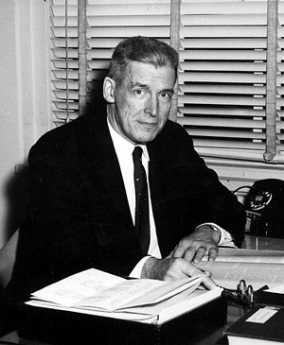
|
| Jonathan Rhoads |
Charitable institutions and other non-profit organizations occasionally assemble an endowment and thus develop a need for an oversight committee to hire (and occasionally fire) an investment manager, to monitor the fund's management, and to assess the manager's fees. The meetings of the oversight committee could, therefore, be pretty brief, related to two numbers. How had the endowment portfolio performed, compared with some acknowledged benchmark? To these two numbers might be added a brief summary of the investment management fees, compared with the usual benchmarks (40 basis points, or .4%, would be a common standard). However, an agenda so mercilessly sparse seems an inadequate reason to convene a group of worthies for an hour, and quite commonly the committee will chat about investments in general, hoping to pick up some personal pointers. A good tip or two makes the whole effort seem worthwhile.
On one such occasion in 1987, the famous Quaker surgeon Jonathan Rhoads, Sr was chairman of the committee. The manager of the endowment was a handsome fellow whose picture had occupied a full page of the New York Times financial pages just a day or two before this particular meeting. The picture had been truly spectacular, the tailoring was remarkable, and he surely had perfect teeth. As this gentleman entered the room, the committee gathered around, slapping his back and congratulating him on his fame with great jollity. Little did the group know that within thirty days, the stock market would have its most severe drop in almost twenty years. Unnoticed at first by the merry-makers, Jonathan Rhoads had sat down at the head of a perfectly empty long mahogany table, and was intoning to the empty seats, "We will now begin by reading the minutes of the last meeting of this committee". Visibly shaken, the group immediately broke up and took their seats.
Rhoads went on. We were now to hear the report of our portfolio by our manager. Proudly, it was noted that in February we had bought XYZ for 20, and in July we had sold it for 44. And in March we had bought ABCs for 60, and it now stands at 100. When he had concluded, the chairman said, "That's fine. That's just fine. But what bothers me is that point of confusion." Why, what confusion, Dr. Rhoads?
"The confusion between investment genius, and just being in a bull market." Later the same month, the stock market suddenly dropped 22% in one day, thus guaranteeing that no one in the room would ever forget the episode.
Lin
Lindley B. Reagan, M.D.
July 16, 1918 -- September 10, 1995
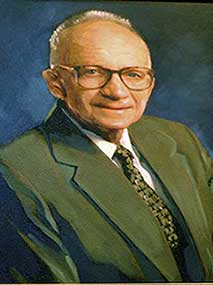
|
| Lindley B. Reagan, M.D |
The first and oldest hospital in America, the Pennsylvania Hospital at 8th and Spruce Streets, always had a strong Quaker flavor but a unique medical tradition as well. Since it was the only American hospital for decades, later becoming the home hospital of the first medical school in the country, it impressed its ideals and traditions on the whole of American medicine. However, it imposed so many difficult demands on its trainees that a century or more of an evolving profession simply moved away from copying it. It was, in 1960, the last hospital in the country to begin paying its resident physicians anything at all, one of the last privately controlled American hospital to adopt a billing and accounting department, and one of the last if not the last to regard a handful of private beds as merely a convenience for the patients of the staff physicians. In 1970 its method of maintaining inventory was to notice that the supplies on the shelf were running low, and ordering some more. It was founded in Benjamin Franklin's words, for the "sick poor, and if there is room, for those who can pay," and could only survive into the late 20th Century through private donations and the freely contributed services of the doctors, student nurses and administration. No amount of money could induce people to work as hard as they worked. You might say this was the only aspect of Medieval monasteries which Philadelphia Quakers thought worthy of imitating.
Somewhere in this set of ideas was the treasured concept of a rotating internship, preferably two years long, prior to entering specialty training through a residency. In 19th Century Vienna, it was a matter of rule that an intern was just that, physically confined within the walls for the term of service, and a resident was just that, someone who lived on the campus. The Pennsylvania Hospital had no such rule, but since it paid the doctors nothing for five or six years of eighty-hour weeks, their poverty forced them to satisfy the Viennese rules by default. Entertainment was bridge or poker in the intern quarters, conversational chit-chat was a description of bizarre cases or peculiar patients, a weekend "off-call" was a good time to catch up on correspondence. There were student nurses around, of course, but the matron was a pretty no-nonsense chaperon. Every class of interns contained one or two millionaires by inheritance, but peer pressure made them nearly indistinguishable in the daily routines. Aristocrats' main value to the resident physician community was their access to the ruling families in the city, and hence to the governance of the hospital, in case governance should occasionally abuse the vulnerability of the trainees.
I find in retirement that most of my colleagues are now willing to tell stories of the "old days" which they were unwilling to tell at the time. Over several glasses of the finest single-malt in a walnut-paneled club, one such story recently surfaced. It concerned Lin.
Lin was a member of an old Quaker family, surprising everybody during the Second World War by volunteering as a junior physician in the Navy. He was assigned to a marine regiment in the Pacific Theater and went through some of the most murderous fightings on Iwo Jima and Guadalcanal. Our grapevine reported that the enlisted Marines in his outfit absolutely worshipped him, and I easily believe there was a lot of quiet heroism behind that gossip. He told me he had decided to become an internist while in the Pacific, but somehow only a surgical residency was available when the War was over, so he took it. He was probably the best internist on the staff, and it showed in his conduct of surgery, where it sometimes matters more what you decide to cut than what you cut. He always looked exhausted, but never hesitated to drive himself another hour when the situation demanded it. One day, he had to excuse himself from an operation, an almost unheard-of event, and testing his own urine, found it loaded with sugar. So, the soft-spoken Quaker internist who was primarily doing surgery had to add the burden of insulin injections to his load. If he ever complained about that or any other thing, no one could remember hearing it.
At about the third glass of single malt, the story came out. My old friend, like the rest of us, had to spend a year as a surgical intern during the two-year rotating internship; he hated surgery and didn't mind telling the world. At the moment in question, he was the assistant at some neck surgery, with Lin performing the actual surgery. He was told to take a long pair of scissors and cut off the excess strands of sutures after Lin tied the knots; that was known as trimming the ligatures. They were working deep in the crevices of the patient's neck. Lin held up the loose ends of the knot and ordered, "Cut". My friend inserted the long scissors into the hole and snipped -- accidentally cutting right through the jugular vein.
As would be expected, a fountain of blood came up out of the hole, and Lin stopped it by putting his thumb on the cut ends of the vein. "Well," said Lin, "I guess we'll have to fix that." And did.
With tears in his eyes, my octogenarian friend cried out to the startled clubroom. "God bless you. God bless you, Lin."
Perhaps the point isn't clear to those who didn't go through the process, so let's be more explicit. Both my friend and I worshipped Lin, as a person, a teacher, and a surgeon. He was the perfect agent for his patients, without the tiniest trace of conflict of interest, income-maximizing or whatnot. He was as technically skillful as it is useful to be, but he was the thinking man's surgeon as well as the utterly faithful servant of the best interests of the humblest patient. He was, in the opinion of his closest professional associates, the best surgeon in the world. In need of surgery ourselves, all of us would have flown the Atlantic to have him operate on us. For reasons of his own, he was to spend the forty years of his professional life in a small country town with a small hospital, scarcely a famous surgeon but a beloved one to his community. Over the past sixty years, I have had a number of opportunities to know many surgeons who would be in contention for the title of the best surgeon in the world. Some have written books, some have struggled successfully upward through vicious competition, some of them would be called "Rainmakers" if the research world followed the pattern of lawyers and architects. One or two have won Nobel Prizes for surgical innovations, but that's different from being the best surgeon around. The best surgeon in the world was Lin, faithfully plying his trade in a little town that could not possibly know how lucky they were.
Link to PHILADELPHIA PHYSICIANS
To skip back to GENERAL TOPIC OF PHILADELPHIA PHYSICIANS, click the indicated place below:
» Click here for PHILADELPHIA PHYSICIANS «
Link to:Medical Club of Philadelphia
This concludes the general topic Medicine in Philadelphia. The more specific topic area of the Medical Club of Philadelphia (founded 1892 and still operating) can be reached by clicking on the title below. It's large, so wait a moment for it to come up:
» Click here for THE MEDICAL CLUB OF PHILADELPHIA «
Medical Club of Philadelphia
Philadelphia City Controller
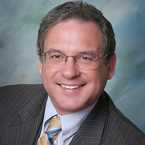
|
| Alan Butkovitz |
The Right Angle club was pleased to hear the City Controller, Alan Butkovitz, give us an insider's view of the municipal finances, but was a little startled to hear how badly the national banking crisis has affected our city. While of course the city does a lot of things, its present finances can be summarized as mainly consisting of two things: the pension system and the management of police/fire/corrections.
Mayors of this city for several decades have been following the national pattern of government to transfer its deficits to the pension funds of the employees. That has the effect of shifting the cost of present operations into the far future and avoiding present confrontations by promising even more generous pension benefits in the future. Over time, the future gets closer and closer; to a large degree, it is right now. Pension funds are largely independent organizations, supposedly receiving current contributions to be invested for future distribution. That requires an assumption about how much investment growth will be achieved in the meantime, now set by the Philadelphia Board of Pensions at 9%. That's not impossible to achieve in some medium-term intervals. But it's optimistic, even inconceivable, for long-haul investing; over periods of thirty or more years, most experts say that 4% is about all anyone gets. More to the point, 9% is particularly unachievable right now, in the present crash of national financial markets. That's bad enough, but repeated shortfalls in contributions to the fund have left it funded at 53% of the calculated requirement to pay the pensions of the future, even using the unrealistic 9% return assumption. A few years ago, Mayor Rendell worried about the underfunding and brought it up to 70% with a billion-dollar bond issue. Unfortunately, the crash in the markets has brought it right back down to 53% again. So, it's fair to say the pension fund is a couple of billion dollars short, even if you accept a 9% income accumulation -- which you probably can't, but at least it brings the pension fund to 70% funding in forty years. Call it four billion dollars short, just to be conservative, since it is presently admitted to being two billion. That isn't Mayor Nutter's fault, but it's sure his problem; and if it gets worse, it will be seen as his fault.
The other expense item of note includes 42% of the budget in the police, fire and prisons systems (education is handled separately through the school board). If you fired all those people, or they quit, we wouldn't have a city, we would have a jungle. But the Controller describes all three as terribly mismanaged, with the local police stations in a deplorable state of disrepair and degradation, bathrooms you wouldn't think of using, and so on. The fire department has only a minor number of fires to fight, perhaps four or five hundred a year, but it includes the emergency rescue services which respond to a couple hundred thousand calls a year. The rescue people report to the firemen, and there is social friction between the two, working to the disadvantage of rescue. It costs about $500 to respond to a call, and it isn't entirely satisfactory to send a fire truck to help someone with a heart attack. The Controller had a number of horror stories about administrative mismanagement in this area. As far as prisons go, everybody knows prisons are bad places, and ours are no exception. Confrontation with the unions is definitely in the future for the Mayor, and the city is going to be in pretty bad shape if he doesn't win some arguments.
That's the expense side of the municipal budget; the revenue side is equally gloomy. The offhand comment was that real estate taxes could double without bringing the pension system under control for twenty years. If our taxes are significantly higher than neighboring cities, or even just the same as in cities with superior uniformed services, it will be hard to attract and hold business taxpayers, causing municipal finance to spiral downward. Along the course of this patter-song, it isn't exactly reassuring to learn that it now takes the City 21 days to process a check and that absenteeism in some departments runs to 20%. We've heard a lot of denunciation of Mayors Giuliani and Bloomberg in New York, but their absenteeism runs 3% because investigators are sent to the house of an absentee, who is subject to court martial if he isn't home.
Somewhere in this nightmare lurks the hidden migration of the unionized workers. Starting with Mayor Rizzo or even earlier, the uniformed services were the main political support of the Democrat political machine. Quietly, they have moved out to the suburbs where the schools are better and the taxes are lower, and it is now said that 70% of union workers live (and vote) outside the city limits. The unions talk tough, bluffing through the uncertainty when their members can no longer provide the votes to be so fearsome. To some degree, their weakening political power is augmented by using their pension funds to provide construction loans for new commercial real estate. Some of that political clout is used up by the need to get zoning variances and tax abatements for the projects. A lot of these power shifts are hard to assess from the outside, but a trend is clear.
The controller didn't mention it, but the city is not only a pension investor in bonds but also an issue. Interest rates are about as low as they can get while the Federal funds rate is nearly zero, so there is only one direction they can go in the future -- sooner or later they will go up. By the iron law of bond financing, the value of the underlying principle will then go down. That could provide an opportunity to buy them back at lower prices, or it could break the city's financial back financing higher interest payments. However, for the pension fund side of things, exactly the opposite is true. Maybe Hizzoner can tap-dance around these dangers and opportunities, but most mayors would have trouble pronouncing the words.
It's part of the job description for the controller to be a pessimist. But the most you can make of this mournful dirge is to hope he is completely wrong.
School Vouchers (7)
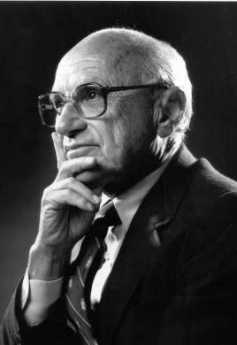
|
| Milton Friedman |
S chool vouchers might seem unrelated to the struggle to enact Medical Savings Account legislation, but Milton Friedman June 9, 2005 article in the Wall Street Journal suggests that resistance to both ideas comes from the same source. That's appealing, so let's quote the Nobel Prize winner at length. He's speaking of the 23-year interval since the publication of Paul Copperman's book A Nation at Risk:
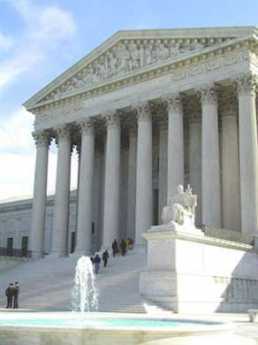
|
| Supreme Court |
"Throughout this long period, we have been repeatedly frustrated by the gulf between the clear and present need, the burning desire of parents to have more control over the schooling of their children, on the one hand, and the adamant and effective opposition of trade union leaders and educational administrators to any change that would in any way reduce their control of the educational system.
"We have been involved in two initiatives in California to enact a statewide voucher system(in 1993 and 2000). In both cases, the initiatives were carefully drawn up, and the voucher sums moderate. In both cases, nine months or so before the election, public opinion polls recorded a sizable majority in favor of the initiative. In addition, of course, there was a sizable group of fervent supporters, whose hopes ran high of finally getting control of their children's schooling. In each case, about six months before the election, the voucher opponents launched a well-financed and thoroughly unscrupulous campaign against the initiative. Television ads blared that vouchers would break the budget, whereas, in fact, they would reduce spending since the proposed voucher was to be only a fraction of what government was spending per student. Teachers were induced to send home with their students misleading propaganda against the initiative. Dirty tricks of every variety were financed from a very deep purse. The result was to convert the initial majority into a landslide defeat. This has also occurred in Washington state, Colorado and Michigan. Opposition like this explains why progress has been so slow in such a good cause.
"The good news is that, despite these setbacks, public interest in and support for vouchers and tax credits continues to grow. Legislative proposals to channel government funds directly to students rather than to schools are under consideration in something like 20 states. Sooner or later there will be a breakthrough; we shall get a universal voucher plan in one or more states. When we do, a competitive private educational market serving parents who are free to choose the school they believe best for each child will demonstrate how it can revolutionize schooling."
Milton Friedman thus advocates three things: Medical Savings Accounts, School Vouchers, and channeling public funds directly to citizens rather than to the institutions which serve them. As an economist, he seems primarily interested in breaking up the financial integration of government and institutions, with school vouchers as a demonstration. As a physician, I was mainly interested in the advantages of Medical Savings Accounts themselves. The theoretical advantage of keeping governments and institutions at financial arms-length was for me only a helpful navigational guideline.
Antitrust agencies have been uneasy for a century about this matter, which lawyers call "vertical integration". The U.S. Supreme Court has repeatedly pondered vertical integration between corporations and suppliers, but so far has drawn back from prohibiting it. The State Oil case suggests the Court perceives such economic concentration is so commonly harmful to the participants that most will learn to avoid it without legal interference. The possibility, after all, does exist that in some circumstances integration might be of some value to the public. Along those lines, an argument could be advanced that paying hospitals directly reduces administrative costs, as compared with sending bills to preoccupied patients. Or the management of hospitals might be more flexible if revenue comes in periodic government payments without economic and seasonal volatility. These and other arguments against the MSA might be examined on their merits, but such arguments have almost never been discussed.
Medical Savings Accounts and school vouchers have encountered the same sort of bewildering guerrilla warfare. Warcries abound, but rarely plausible arguments, and never direct negotiation. Since both proposals are just paperwork reforms, their well-intentioned advocates more astonished at the virulence of the opposition than disposed to imitate it. Somebody is protesting too much. That's all we could see. The common issue between the two reform proposal is whether government funds should flow directly to institutions, or whether it may also flow to individuals, who would then choose between competing institutions. Furthermore, the opponents of reform, which we would have to suppose are the institutions themselves, seem bitterly opposed to any experiments or demonstration projects, as if they recognize that the economic facts will undermine their resistance.
Mind Your Manners
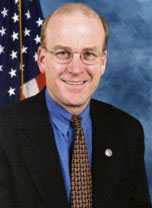
|
| Hoeffel |
In 1948 I was an intern at the old Pennsylvania Hospital, assigned for a while to the accident room. One of the accident-room duties of an intern is to sew up cuts and lacerations that arrive unexpectedly, but some lacerations can be out of your pay-grade and you have to call for help. On the evening in question, the victim had been so thoroughly slashed up that I had to call the chief surgical resident, Dr. Joseph Hoeffel. Hoeffel was big, tall, loud and self-assured, and swept majestically into the accident room with a little fellow trailing him. This follower seemed less than four feet tall but very quick and shifty. He didn't walk so much as he scuttled. Hoeffel bellowed, "Get out here!" and the gnome vanished.
While Joe was examining the laceration problem, the little fellow slipped through a different door to see what was going on. Most of us had the impression this guy might well be the one who inflicted the cuts, but in any event, he didn't belong where he was. "I told you to get out of here, and stay out," bellowed our surgeon. Again the scuttler scuttled away, while Hoeffel put on a sterile gown, sterile rubber gloves, mask, cap, and the whole ceremonial costume. He prepared to do his work, stamping out disease among the sick and injured, when a fist started at the floor. The little guy had slipped into the operating area once more, and soon the fist on the floor quickly flew in a wide arc, ending up on Hoeffel's jaw.
Hoeffel tumbled head over heels across the room, ending up in a corner. I don't think he was knocked out, but he was certainly dazed. The nurses called the police, who made a tumult of their own arriving to do battle. But the little fellow was gone, never to be seen again.
Fifty years later, I had occasion to preside over a meeting of the Right Angle Club, where
Hoeffel's son, the former congressman and current deputy member of the Pennsylvania Governor's cabinet, was the featured speaker. He looked remarkably like his father. I had to wonder if his father's lesson in diplomacy had made any notable effect on his progeny.
Specialized Surgeons
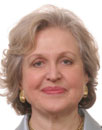
|
| Regina E. Herzlinger |
Local attitudes always somewhat persist among migrants from home. What's distinctive about the Philadelphia diaspora is how unconscious most of them are about still carrying the hometown mark. Philadelphia leaves a prominent birthmark, but it's sort of back between your shoulder blades and you forget it's there. What occasions this observation is a Christmas call from a prominent California surgeon who was once my roommate, back in the days when residents were actually resident in the hospital. More than fifty years ago Bill Doane also served as best man at my wedding. Our conversation turned to clots in the lung, and he related a story. He had once fixed a hernia for a 22-year old girl in the days when it was customary to keep hernia cases in bed for a while. Getting out of bed for the first time, she coughed and turned blue, suddenly on the edge of death. Taken back to the operating room, her chest was opened, and Bill removed a clot which was essentially a cast of the blood vessels of one entire lung. As surgeons like to say, she then did very well.
One doctor can tell such a story to another doctor in four sentences, while lay people who overhear it miss the whole point. The fact is, not one surgeon in ten thousand today could carry this off. Nowadays we train thoracic surgeons to open the lungs; they never repair hernias. Conversely, we train hernia surgeons to fix a dozen hernias daily through a little telescope; they never open a patient's chest. So it is hard to imagine many contemporary surgeons who could recognize this disastrous complication of hernia repair, then fix it themselves in time to rescue the patient. Although this disheartening decline into repetitive super specialties has been forty years in the making, it has been recently popularized with the general public by Regina E. Herzlinger, a Harvard business professor. Writing books and speaking to businessmen groups, she has popularized the proposal to outsource the general hospital into what she calls "focused factories." She rightly characterizes the medical profession as reluctant. She's a nice person, and undoubtedly sincerely believes focused factories will save money, improve quality. But we must not let this idea take hold.

|
| Pennsylvania Hospital |
Specialty hospitals have actually been given more than a fair trial. About a hundred years ago, the landscape was peppered with casualty hospitals, receiving hospitals, stomach hospitals, skin and cancer hospitals, lying-in hospitals, contagious disease hospitals, and a dozen other medical specialty boutiques. With a few notable exceptions, they all failed for the same reason. Sooner or later they found they could not adequately service their specialty without the backup of a full hospital service. Children's hospitals do thrive, but they have patients who are generally of the wrong physical size to fit adult hospital facilities and equipment. There are plenty of things to regret about general hospitals' design, but the inescapable fact is they all must have a very wide range of services to perform any mission, no matter how discrete. It would be still better if the doctors had an equally wide range of skills in their own heads, but the avalanche of innovation and lawsuits has forced sub-specialization, compartmentalizing, and narrowness of viewpoint. Circumstances have forced the profession to hunker down, but that trend must be resisted, not celebrated.
The instant and successful repair of pulmonary embolism make a dramatic illustration, but the reasons for broad medical training are more extensive than that. In the first place, it is much cheaper to use the generalist office than to bounce people to a gastroenterologist for heartburn, a psychiatrist for anxiety, and a dermatologist for pimples. The American employer community is desperate for a way to reduce its burden of employee health costs, and flocks back to their nurturing business schools for advice. They would do better to seek repeal of the tax dodges which tempted them into their present muddle, of course. But in any event, they must be persuaded to recall the disaster of managed care and at least, avoid meddling in hospital design.
That's the cost issue, where specialization surely raises costs. Constant repetition of the same procedure seems superior to first-time fumbling, although it is questionable how long it takes a well-trained surgeon to pick up a new procedure and do it well. But for this system to work, the referring physicians need to be more skillful, not less, in choosing a good one to refer to. There's just nothing like the experience of working for a few weeks in the specialty as a rotating intern, to tell you what to look for and what to avoid. If every doctor in a hospital is making a dozen internal referrals a day, the cumulative effect on the quality of the whole institution is dramatic -- when they have had sufficient past involvement in the specialties to which they now only refer patients. Some specialists will become popular and rich; others will sulk around unnoticed for a while, then go elsewhere. This process, of course, occurs everywhere; what's institutionally distinct is the culture underlying the standards for preferences.
We'll talk later about the Doane brothers of Bucks County, who were judged to be too handsome to hang. Right now, the point of this story can be summarized by the old Pennsylvania Hospital adage, that you must first be a good doctor before you can be a good specialist. Not only was the Pennsylvania Hospital the first in the nation. For sixty years it was the only hospital in the nation, and for decades after that, it was the only hospital in Pennsylvania. In medical history circles, it is said that the history of American medicine, is the history of the Pennsylvania Hospital.
The First and Oldest Hospital in America
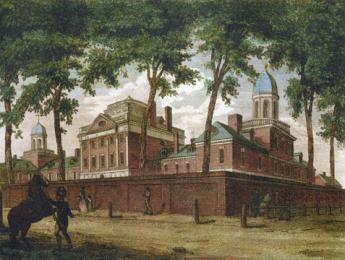
|
| South East Prospect of Pennsylvania Hospital |
There is a painting of the region around 8th and Spruce Streets in the 1750s, depicting a pasture, with cows, and three or four buildings between 8th and 13th Streets. When the Pennsylvania Hospital moved there in 1755 from its temporary location in a house located a block from Independence Hall, there were complaints that it was now located so far out in the woods that it was difficult and dangerous to go there. Still another description of the area is evoked by the provision which the Penn family placed in the deed of gift of the land, strictly forbidding the use of the land as a tannery. Tanneries have always been notorious for giving off noxious odors, so most people wanted them to be somewhere else, anywhere else. In any event, the main activity of Penn's "green country town" at that time was concentrated closer to the Delaware River, and the nation's first hospital was definitely placed in the outskirts. Two blocks further West the almshouse was already in place, but not much else. We are told that Benjamin Franklin had flown his Famous Kite at 9th and Chestnut, using a barn there to store his materials. It might be recalled that the population of Philadelphia, although the second largest English-speaking city in the world, was only about twenty-five thousand inhabitants at the time of the Revolution, and in 1751 was even smaller.
In any event, the first and oldest hospital in America was built on 8th Street between Spruce and Pine, and the Eighteenth Century buildings on Pine Street still present a breathtaking view at any season, but particularly in May when the azaleas are in bloom, and fragrance from the flowering magnolias fills the evening atmosphere for blocks around. Although some people today mistake the Pennsylvania Hospital for a state hospital, it was founded in the reign of George II, decades before there was such a thing as the State of Pennsylvania. The Cornerstone was laid by Benjamin Franklin, with full Masonic rites. Most doctors regard a hospital as a mere workshop, but the affection with which many Pennsylvania physicians regarded their special hospital is indicated by the number who have requested that their ashes be buried in the garden.
For two hundred years, beginning with the first American resident physician Jacob Ehrenzeller, the interns and residents were paid no salary, so they had to live on the grounds. An Internet was just that, interned within the four walls for at least two years. Because the resident physicians had no money, they stayed in the hospital at night and on weekends, playing cards and swapping stories. The hospital was home for them, as it was for the student nurses, likewise unpaid but more strictly confined and supervised. This penury seemed acceptable because the patients were mostly charity ward patients, otherwise unable to pay for their own care. Ehrenzeller finished his medical apprenticeship and went to practice for many decades in the farm country of Chester County, but gradually upper-class Philadelphia moved from 4th Street westward to and beyond the hospital, and two of the richest men in American history, Morris and Biddle, had houses within a block of the hospital, although Morris never lived in his house, having more pressing matters in debtor's prison. Therefore, later resident physicians at the hospital had the potential of setting up a private practice in the area and becoming society doctors as well as academically prominent ones. Being a charity hospital in a rich neighborhood created the potential for volunteer work by the town aristocrats and large bequests for charity. The British housed their wounded in the hospital during the Revolutionary War and shot deserters against the red brick wall of the small cemetery to the north. A century later, there were a couple of dozen rooms for private patients in the hospital for the convenience of the doctors and the neighbors, but everyone else was a charity patient. And a century after that, the hospital still did not have an accounting department to collect bills and tended to regard people who asked for a bill as a nuisance. Benjamin Franklin is regarded as the Founder of the hospital, and his autobiography famously describes how he fast-talked the legislature into matching the donations of the public, not mentioning to them that he had already collected enough promises to see the project through. This seems in character; Franklin's biographer Edmond Morgan summed up that, "Franklin doesn't tell us everything, but what he does tell us, is straight." The idea for the hospital was that of Dr. Thomas Bond, whose house is now a bed and breakfast on Second Street, but it was characteristic of Franklin to be the secretary of the first board of managers of the hospital. In Quaker tradition, the clerk of a meeting is the person who really runs the show. It thus comes about that the minutes of the founding board were recorded in Franklin's own handwriting, among them the purpose of the institution, which is to care for the Sick Poor, and if there is room, for Those Who can pay. This tradition and this method of operation continued until the advent in 1965 of Medicare when charity care was displaced by concepts which the nation had decided were better. The Pennsylvania Hospital was not only the first hospital but for many decades it was the only hospital in America. Its traditions, sometimes quaint and sometimes glorious, cast a long shadow on American medicine.
REFERENCES
| America's First Hospital: The Pennsylvania Hospital 1751-1841 William Henry Williams Ph.D. ISBN-10: 0910702020 | Amazon |
Money Bags
This little morality tale was told to me by two unrelated sources, one of whom was a staff aide to Wilbur Cohen, the author of the Medicare law. And the other was a high official of Pennsylvania Blue Shield, the appointed administrative agent for Medicare in Pennsylvania. Its relevance to the more recent SNAFU with Insurance Exchanges introducing the world to Obamacare should be fairly obvious.
After Lyndon Johnson rammed the Medicare amendment to the Social Security Act through Congress in 1965, he wasn't shy about drawing attention to it. The press was present in great numbers, with staff officials who had a role in crafting the document, members of Congress, and anyone else who was standing around. The legislation was laid before him and signed with twenty different pens to be presented as mementos to the in-group. Each pen was only used to inscribe about half of one letter of his name, so it was a slow but joyful process. As intended, it got lots and lots of publicity.
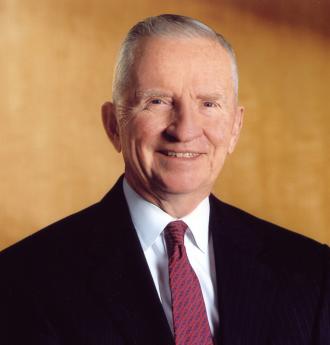 > >
|
| H. Ross Perot |
So, thousands of thankful old folks saw the ceremony on television, though they heard that the law was in effect immediately, and proceeded to dump their medical bills into a shoe box, sending them to Medicare to be paid. Unfortunately, Medicare didn't have an office, a staff, or even a telephone number. These things take time. As fast as they could, the Medicare staff constructed a system of carriers and intermediaries, carriers for part A, and intermediaries for part B. And almost without exception, appointed the local Blue Cross and Blue Shield organizations to be the carriers and intermediaries. Consequently, the organization of Medicare was patterned closely after the organization of the two administrative corporations. Meanwhile, the bills from old folks just kept pouring in through the postal service. It was about all the staff in Washington could do, just to direct the mail out to the local intermediaries and at least get it out of their hair.
Less than a year later, that's how the claims manage to Camp Hill, PA, a little suburban town near Harrisburg. In desperation, Blue Shield had rented a local vacant supermarket and piled the mailbags ten feet high. There were quite a few telephone calls of inquiry, and the old folks were politely told the matter was being looked into. It was beginning to look as though one supermarket wasn't big enough.
Computers were, of course, rented from IBM, who had a policy of renting, not selling, its valuable equipment. Keypunch operators, computer operators were hired, air conditioning was installed, and one team after another of computer programmers was hired -- and fired. Consultants were called, scratched their heads, sent big consultation bills, and turned sadly away. Sorry, but somehow it just doesn't work.
So that's how it happened that one Friday afternoon, a vice-president of Texas Blue Cross named H. Ross Perot came in, accompanied by a fellow with glasses so thick they looked like the bottom of Coca Cola bottles. So far as anyone can remember, the guy with coke-bottle glasses never said one word. The desperate, hopeless mess was explained to Perot, whose salary at that time was rumored to be twenty-five thousand dollars a year, about right for a Blue Cross executive. His background as a kindred Blue Cross person inspired confidence, and the conversation rambled on for an hour or so. Meanwhile, the guy with coke bottles went over to the Penn-Harris Hotel across the street and got to work. By the end of the weekend, he had come back a couple of times, but eventually, would you believe, it really, well it really worked. Contracts were quickly signed, the wheels began to turn, the mailbags in the supermarket began to march through the processing cycle. Blue Shield, the Medicare program, the finances of the nation's elderly, and Lyndon Johnson's reputation -- were all rescued.
As everyone now knows, the Medicare processing contracts made Ross Perot into a billionaire, living on Bermuda in the lap of luxury, eventually upsetting the re-election hopes of George Bush, senior by running for President himself on a third party ticket that had something or other to do with giant sucking sounds. A Congressional investigating committee looked into the outrageous profits Perot had extracted from his homeland's elderly, volleyed and thundered. Whether Perot actually thumbed his nose at them is doubtful, but he certainly was in a position to do so.
Meanwhile, whatever happened to that guy with the coke bottle glasses, no one seems to know.
My Years at Stockley
For forty-six years, I drove three hundred round- trip miles from Philadelphia to Stockley, Delaware -- once a month on Saturdays. That takes a whole day, so it kind of means I spent a year at sixty miles an hour, going and coming. In Delaware, they speak of going “South of the Canalâ€, to indicate the little state of Delaware is actually two states or at least two cultures. North of the Delaware-Chesapeake ship canal is the posh little city of Wilmington, where most of the major New York banks are moving to enjoy the special banking laws, and where the Dupont family held majestic court over its Ivy League Camelot. Wilmington has more lawyers than anywhere or at least more white shoe patrician lawyers than anywhere. Little Delaware generated special laws for the benefit of corporations, so a whole hive of corporation lawyers generated an industry of pretending that General Motors and IBM are headquartered there. Those lawyers were once so remote from the graduates of second-rate (i.e. state rather than national) law schools making a living as plaintiff lawyers, that even the doctors in Wilmington were on cordial terms with the Wilmington lawyers.
South of the Canal was something else. I saw burning crosses on several occasions, and my trip took me past two race tracks for horses and two for beat-up jalopies that smash into each other for the fun of it. To be fair about it, I was shot at twice, once below the canal, and once in Wilmington, that's another story. The incident below the canal was not terribly spectacular; I just heard a loud noise as I drove past Elks lodge, or maybe a Moose lodge, and there was a nice round hole in my fender when I got out of the car. I suppose someone in the lodge was just careless with his gun, but it is not impossible that I had crowded a pick-up truck which retaliated with fair warning.
I met a nice lady from Rehoboth who tells me she remembers when the highway was built; before 1930 or so, there was no road connecting lower Delaware with the outside world. The native people speak with an accent which isn't quite Southern and which is said to be very close to true Elizabethan English. The area was settled by Swedes before the English came, so the people are quite handsome in a sort of Daisy Mae, L’il Abner way. The highway has an interesting history. Coleman DuPont purchased the land and built the highway at his own expense. If you know anything about rural legislatures, you can guess what happened next. He offered the highway to the State and the legislature refused to accept the maintenance costs. When he then hired his own police force to patrol the highway, the legislature reconsidered and accepted his offer to give them the highway.
My trips to this area have their destination at the Hospital for the Mentally Retarded in Stockley, Delaware. In spite of the way it is spelled, it is pronounced "Stokely". A state cop once forgave my speeding violation when I told him I had been at "Stokely". He said that in spite of my out-of-state license plates, I must be telling the truth if I knew how to pronounce it. The hospital has always kept a sign-in log in the administration building, and it is fun to see my signatures going back to 1958, month after month. I've had a couple of close calls or near-accidents on the highway which I haven't told my wife about, and on two occasions the ice or fog was so bad I had to turn around and come home without completing the trip. The trip ordinarily isn't so bad. The car is on cruise control, there are medical education tapes to play (Audio Digest, courtesy of the California Medical Association), and a sort of hypnosis makes you forget where you are going until you get there.
The medical director is a nice young fellow who has a practice in a nearby (25 miles) town and stops by for a few hours a day. Except for him, just about every resident doctor in thirty years has been foreign-born, and I would judge, very poorly paid. So, several years before I came to Stockley, someone had the idea of bringing in consultants from Wilmington, Philadelphia, and Baltimore. In the early days that was reasonably easy to do, because the hospital was filled with six hundred perfectly fascinating cases. I've seen several albinos and one thirty-year-old who was no bigger than an infant in arms. They used to have a number of cases of grotesque hydrocephalus, where the poor child grew a head larger than you could put your arms around and which would develop huge bedsores because the child couldn't move his head, let alone lift it. Because the Delmarva Peninsula has been a closed society for over three hundred years, there are lots of cases of rare inherited diseases. I have seen many cases of disorders that other doctors have only maybe read about, and I must admit I loved the experience.
But you know after you spend as much time with them as I have, they stop being interesting cases and become individuals, with names and personalities. Since the aging process is accelerated in several common diseases like Mongolism, I have known some of the patients' as little children, then as adults, and finally as dying withered victims of senility. Many times, I have watched the central agony of mental retardation; the children inevitably outlive their parents and ultimately have no one to love them except the institution.
In that role, Stockley does pretty well, although perhaps not as well as it used to do. The switch seems to have happened with the John Kennedy administration when money for the retarded became abundant. That landmark was especially memorable on a Saturday when the Russians menaced us over Cuba. I never knew we had so many eight-engined bombers as circled over the Dover Air Force Base that day. Years later, a pilot brought his son to see me, and I asked him. "Yup," he said. "we were carrying eggs, all right." "Picked them up in Alaska."Net Neutrality

|
| Bob Fernandez |
Bob Fernandez, a reporter for the Philadelphia Inquirer since 1993, recently addressed the Right Angle Club about Net Neutrality. He certainly knows his stuff about technology, but he got blind-sided, this time about politics. The term "net neutrality" is bewildering to most of us, and somehow it always had a ring of phoniness to it, as though it had been professionally synthesized by a corporate PR officer. And curiously, it seems to have much less interest to women, while it brightens up the eyes of almost any male audience. Men all have an opinion about it, even though the opinions differ from each other. Our speaker clarified this matter somewhat, by explaining that Netflix and Comcast have been dueling over this for several years. For one thing, Netflix consumes 40% of the bandwidth capacity of cable television.
In the commercial world, such a market dominance usually leads to the attitude by the customer (Netflix, in this case) that if they provide such a large amount of business, they are entitled to a volume discount. The seller, on the other hand, tends to feel that such a customer always wants special treatment so they can demand an extra-high price. The rest of the technical discussion is usually just special pleading, having to do with bandwidth, etc. The technical part was quite interesting since the field is constantly changing, but it wasn't what they were really arguing about.

|
| Net Neutrality |
The next day's Wall Street Journal ran a commentary from the Republican member of the Federal Communications Commission, declaring technology had nothing to do with it. President Obama had instructed the Democratic majority of the commission to make cable television into a regulated utility, and Chairman Wheeler had complied. In an instant, the issue was no longer technical, but a Constitutional issue of whether the President has a right to over-rule an "independent" commission in its judgment of a technical issue. Since the Constitution never mentions Independent Commissions, it could become quite a tangled issue.
The Wall Street Journal also had a side commentary of its own. Quite a normal political squeeze job. Congress and Presidents love to impose irritating regulations, for the sole purpose of shaking the money tree. That is, inducing both sides of a controversy to donate campaign funds, dragging it out for a few years, and then letting the corporations run their business as they please. My, my. Such a cynical public we are developing. Maybe what we need is an Evita Peron, to do this dirty work in a smoother way, so characteristic of the female sex.
Net Neutrality and Vertical Integration
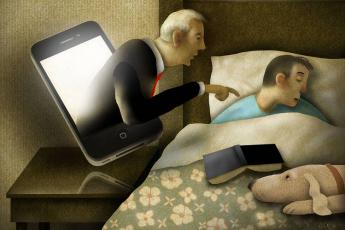
|
| Late Hour Calls |
My fancy new cell phone has an annoying habit of ringing a bell every time an e-mail arrives, which is a little puzzling when it rings in the middle of the night. The email program displays time of arrival, so after a while, I took the trouble to see who was emailing me at 4 AM. It seems to be spam and other commercial programs, but it is also an occasional letter with a large attachment, which had been sent several hours earlier. At this, a light began to go on in my head.
I had been told the internet measures the size of files and puts big ones at the end of the queue. That seemed to explain the occasionally delayed transmission of ultra-large emails at times of heavy internet traffic. And it brings up the issue of net neutrality. If the traffic in large files grows enough, it might eventually clog the wires and bring things to a halt. The internet providers would have to spend money to build additional capacity, and it only seems fair to charge big users more for the costs they have created. That would seem a reasonable technological argument for allowing the networks to impose differential pricing, and for overturning the idea of net neutrality.

|
| Comcast and NBC |
Unfortunately, it might or might not be a sincere argument for resisting net neutrality, since there are major commercial issues at stake as well. For example, Comcast is trying to purchase NBC; its motives are clarified by remembering that a few years ago it tried to purchase Walt Disney. In both cases, a common carrier would be acquiring a "content provider", and thus acquiring a competitive advantage over competitive internet network providers who lack a captive source of content. A strong temptation would exist to slant the internet charges to the disadvantage of other competitors, thus providing a motive to get involved in insincere arguments about net neutrality. What we seem to have here is a familiar antitrust legal doctrine of "vertical integration". For years, vertical integration was prohibited, but the U.S. Supreme Court reversed that prohibition a few years ago, in the case of State Oil v. Kahn. Lewis van Dusen and I had been in the audience of the State Oil arguments, because of our interest in the implications of vertical integration for the medical profession (doctors versus hospitals, for example).
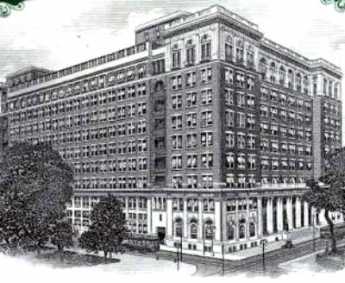
|
| Curtis Publishing |
Although the example of Curtis Publishing was not introduced into the arguments of State Oil versus Kahn, it was much in my mind and might well have been used effectively to demonstrate the vulnerability of any corporation which attempts to become vertically integrated by purchasing its suppliers and/or distributors. Curtis Publishing, a few blocks from my office, had been a successful magazine publisher, so successful that it had enough profits to buy Canadian forests to use for paper pulp in its magazines. The outcome was the bankruptcy of the profitable magazine company when the paper pulp business fell on hard times. No antitrust action to prohibit vertical integration was necessary; the dismal fate of Curtis and similar integrators stood as an effective restraint on anyone else who was tempted to get into the vertical integration business. That may be a little hard to follow, and it took the Supreme Court many years to get to that point. But the fact remains that vertical integration is no longer illegal because it is effectively restrained by recognition of its dangers.
So, if we are getting into the insincere argument business, it is time for someone to put his arm around the shoulders of Comcast. Let's whisper that avoidance of the net neutrality dispute is kindly advice, offered solely for Comcast's own good.

|
| Comcast Center |
And, having gone this far in poking into other people's business, there might be some value in giving some advice to the antitrust lawyers. This sort of case can take years, even decades, to evolve through the legal system. And while its resolution will be phrased in legal terms, I'm not so sure that's sincere, either. It takes me back to the IBM case, where one of the junior lawyers was courting one of my daughters. This young fellow sat for months in front of a microphone at a deposition, doing nothing but read documents into the record. Although he was handsomely paid, the lawyer finally got so sick of the boring futility of dictating a mountain of transcript no one would ever read, into a microphone in an empty room, that he quit. And in the opinion of observers on the courthouse steps, the case was finally determined by the Judge's decision that the patent infringement business was trivial compared with the fact that IBM was mass-producing the greatest innovation of the century -- and the patent-infringement people were just getting in the road.
That may or may not have been the case, but it raises the question of whether antitrust law is wisely based when it considers, not the welfare of competitors, but the strength and vitality of competition itself. What might thus be considered paramount, and perhaps occasionally is so, is the economic welfare of the nation. At present, the newspapers regard this issue as a fight between Netflix and Comcast, and so are now free to devote news attention to other matters. I don't think so. I believe it directly challenges the operation of the Law, which contends that vertical integration eventually takes care of itself. To me, that is only true if circumstances give us enough time to wait it out. In the long run, as Maynard Keynes quipped, we are all dead.
14 Blogs
Quaker Investment Committee
 Quakers expect results from their investment managers, not just Wall Street gossip.
Quakers expect results from their investment managers, not just Wall Street gossip.
Lin
 Can a town of 5000 residents, with a two hundred-bed hospital, have the services of the best surgeon in the world? It all depends on your definitions.
Can a town of 5000 residents, with a two hundred-bed hospital, have the services of the best surgeon in the world? It all depends on your definitions.
Link to PHILADELPHIA PHYSICIANS
.
Link to:Medical Club of Philadelphia
In 1992, it's Executive Director summarized the century-long history of this last surviving club of physicians, devoted exclusively to non-medical affairs.
Medical Club of Philadelphia
 Founded in 1880, this social club of Philadelphia physicians is devoted to non-medical events.
Founded in 1880, this social club of Philadelphia physicians is devoted to non-medical events.
Philadelphia City Controller
 A City Controller is expected to criticize the city's administration. Alan Butkovitz does his duty.
A City Controller is expected to criticize the city's administration. Alan Butkovitz does his duty.
School Vouchers (7)
 Health Savings Accounts,like school vouchers, dislodge government's patronage control over a vital public service. Both of them redirect tax money back to the public, who choose among vendors for themselves. Interestingly, it is unions who seem most threatened by this.
Health Savings Accounts,like school vouchers, dislodge government's patronage control over a vital public service. Both of them redirect tax money back to the public, who choose among vendors for themselves. Interestingly, it is unions who seem most threatened by this.
Mind Your Manners
 The surgeon father of a local congressman once learned a hard lesson.
The surgeon father of a local congressman once learned a hard lesson.
Specialized Surgeons
 Specialty hospitals have actually been given more than a fair try. About a hundred years ago, the landscape was peppered with casualty hospitals, receiving hospitals, stomach hospitals, skin and cancer hospitals, lying-in hospitals, contagious disease hospitals, and a dozen other medical specialty boutiques.
Specialty hospitals have actually been given more than a fair try. About a hundred years ago, the landscape was peppered with casualty hospitals, receiving hospitals, stomach hospitals, skin and cancer hospitals, lying-in hospitals, contagious disease hospitals, and a dozen other medical specialty boutiques.
The First and Oldest Hospital in America
 The history of American medicine is the history of the Pennsylvania Hospital.
The history of American medicine is the history of the Pennsylvania Hospital.
Money Bags
 When Medicare started it was chaos, worse confounded.
When Medicare started it was chaos, worse confounded.
My Years at Stockley
New blog 2018-08-22 22:39:22 description
Net Neutrality and Vertical Integration
 Net neutrality is a new issue with several other issues buried in it. Here we take up its relation to antitrust, particularly the legal concept of vertical integration.
Net neutrality is a new issue with several other issues buried in it. Here we take up its relation to antitrust, particularly the legal concept of vertical integration.